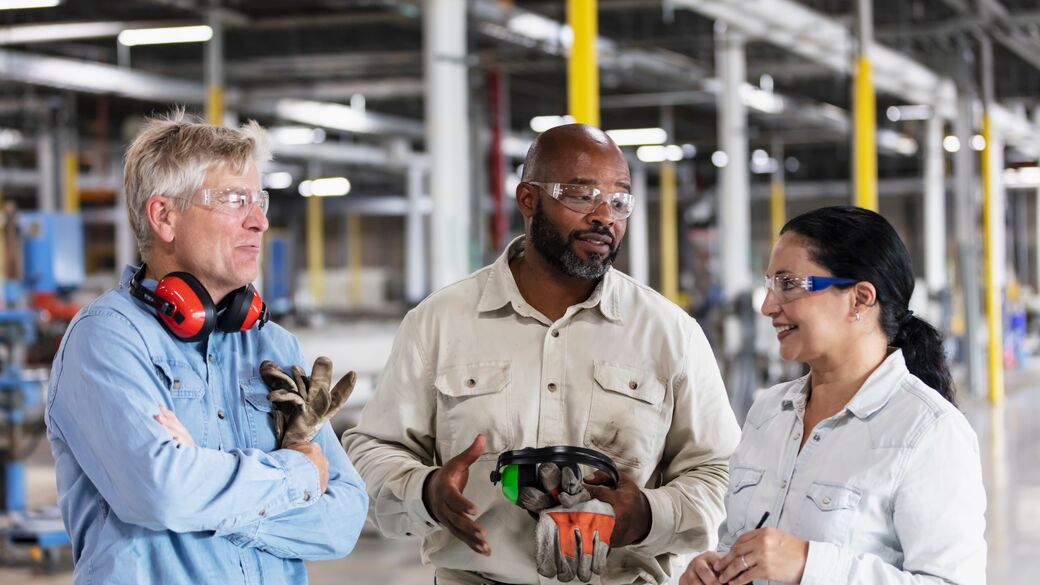
Strengthening your workforce in a tech-powered world
The manufacturing industry is seeing incredible growth, pushed forward by recent legislation like the Infrastructure Act and the Creating Helpful Incentives to Produce Semiconductors (CHIPS) Act. Yet to realize this continued growth, manufacturing leaders need to create and execute strategies that encourage factory productivity, worker engagement, new technology integration, and sustainability.
To learn more about manufacturing successes and struggles, we combined insights from 1,400 manufacturing leaders and 1,200 manufacturing workers globally to create the “Future of Work in Manufacturing” report, which uncovers transformative strategies for workforce satisfaction. Here are a few of the key findings, trends, and insights that can influence manufacturing leadership strategies today and well into the future:
Part of a manufacturing organization's success is dependent upon the satisfaction and engagement of its workers. High engagement leads to higher productivity, less turnover, and a better-performing company. In 2024, 57% of managers rated the morale in their workplace as high compared to only 45% of workers rating their own morale as high—and both have declined since 2023. This gap indicates that managers may not understand the complete picture of worker satisfaction, which can, in turn, prevent them from taking appropriate actions to increase morale and boost engagement.
If manufacturing organizations want to stay competitive while increasing productivity and efficiency, they need to keep up with modern technologies. Yet despite manufacturers making increasing investments in technology, only 39% of workers in 2024 viewed their workplace as "very modern," compared to 52% of managers. This disconnect may show that frontline manufacturing workers just aren't seeing the use and innovation of new technologies every day. It may also show that because managers are likely to be the ones making decisions around adopting new technology, they may also be more tuned in to these modernization efforts.
Upskilling is a great way to prepare your workers for the future of the organization, provide them with new skills to handle new technologies, and increase their engagement and productivity. While 91% of managers in 2024 indicated that their companies are prioritizing upskilling, only 70% of workers agreed, marking a 10% decrease from the previous year. This highlights the need for better communication and implementation of upskilling initiatives at all levels—including on-site training or access to online learning platforms.
To stay competitive, not only do manufacturing organizations need to stay current with technology, but they also need to implement sustainable practices and policies to help them scale and thrive in the future. Despite this imperative, sustainability remains a priority for only about half of manufacturing companies. In 2024, 61% of managers and 45% of workers reported that sustainability is a high priority, indicating a need for more visible and impactful sustainability efforts across the industry.
Manufacturing leaders are focused on making their supply chains more sustainable and resilient, especially after the disruptions of the past few years. 75% of manufacturing managers in 2024 identified supply chain resilience and sustainability as critical to their operations. The top initiatives they’re taking to improve their supply chain resilience include implementing digital tracking tools for better visibility, adopting sustainable materials and practices, and diversifying their suppliers. However, challenges such as costs, regulatory hurdles, and technology gaps are hindering the full realization of these goals.
Manufacturers are increasingly using automation to strengthen production efficiency, quality control, data sharing, and transparency. However, the growth of automation begs the question of how far these capabilities can extend, particularly in relation to its impact on existing human-led jobs. In our research, we found that 73% of managers and 53% of workers in 2024 believe their jobs will change due to automation—a drop from 64% the year before. This may indicate that workers are now less concerned about immediate changes due to AI, reflecting a potential shift in perception of automation’s role.
Finally, manufacturing leaders need to anticipate the changing worker landscape. While worker-reported turnover decreased by 6% in 2024, manager-reported turnover increased by 25%, indicating differing experiences and perspectives on workforce stability within the manufacturing sector. To combat this, manufacturing leaders should look for ways to increase engagement and overall worker satisfaction to increase employee retention—with a particular emphasis on providing the right guidance and leadership to both new and seasoned managers.
By creating strategies that boost morale, implement technology, increase upskilling, adopt more sustainable practices, foster more supply chain resilience, support automation, and address turnover, manufacturing leaders can give their workforce the tools and resilience they need to excel and thrive every day.
Read the “Future of Work in Manufacturing” report now.